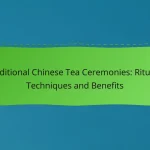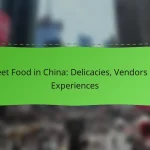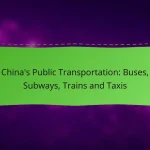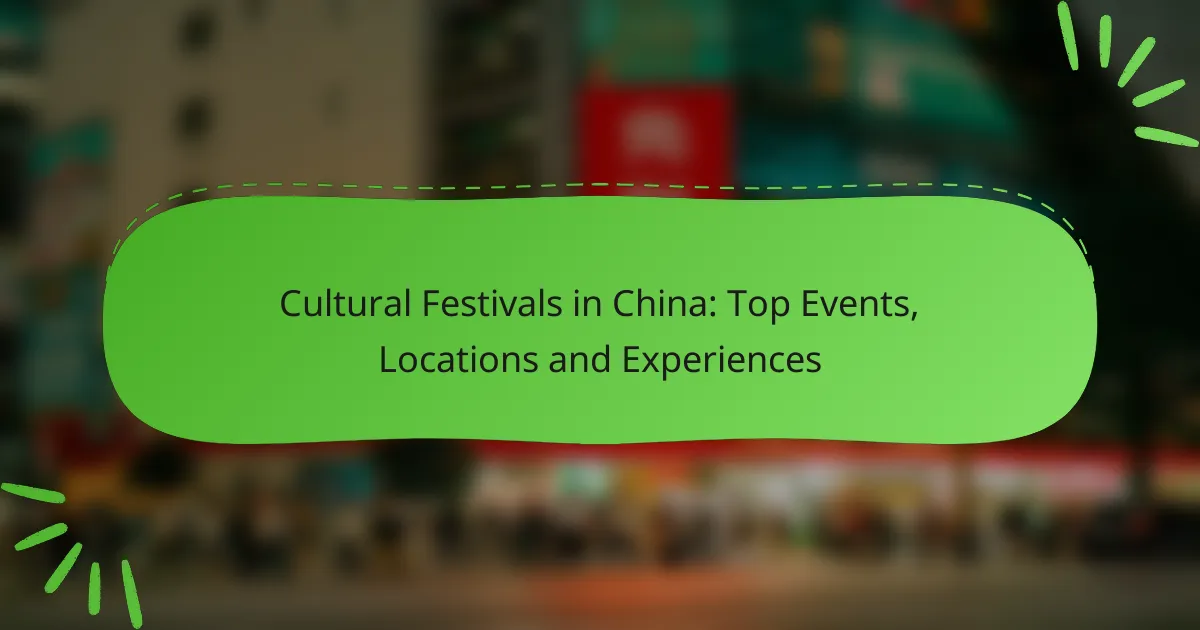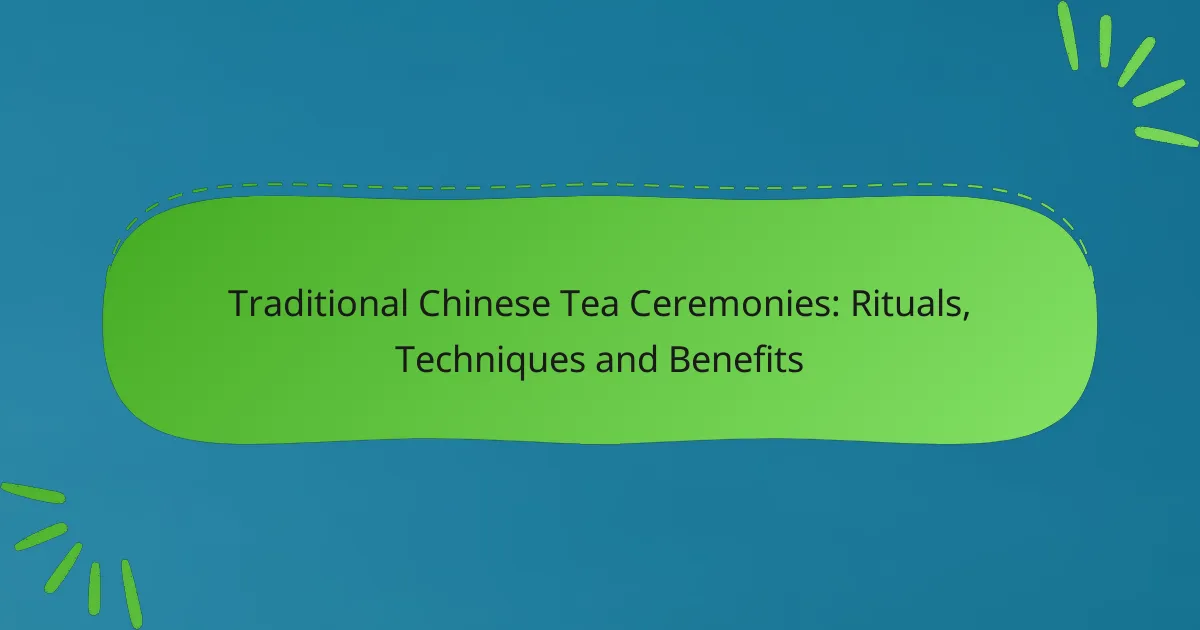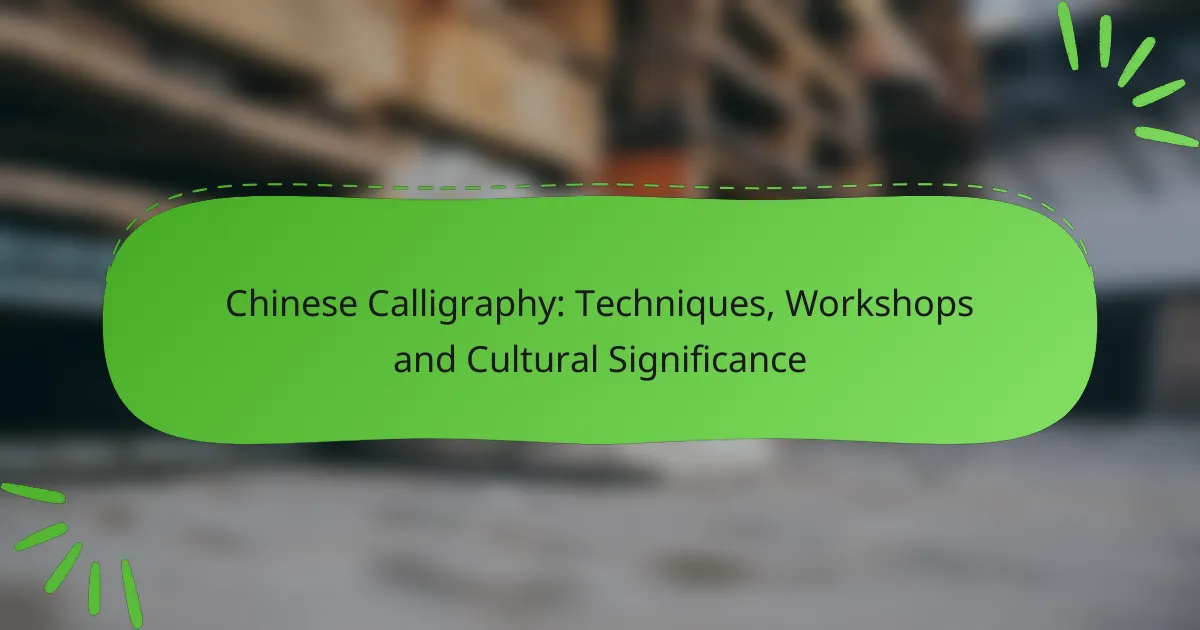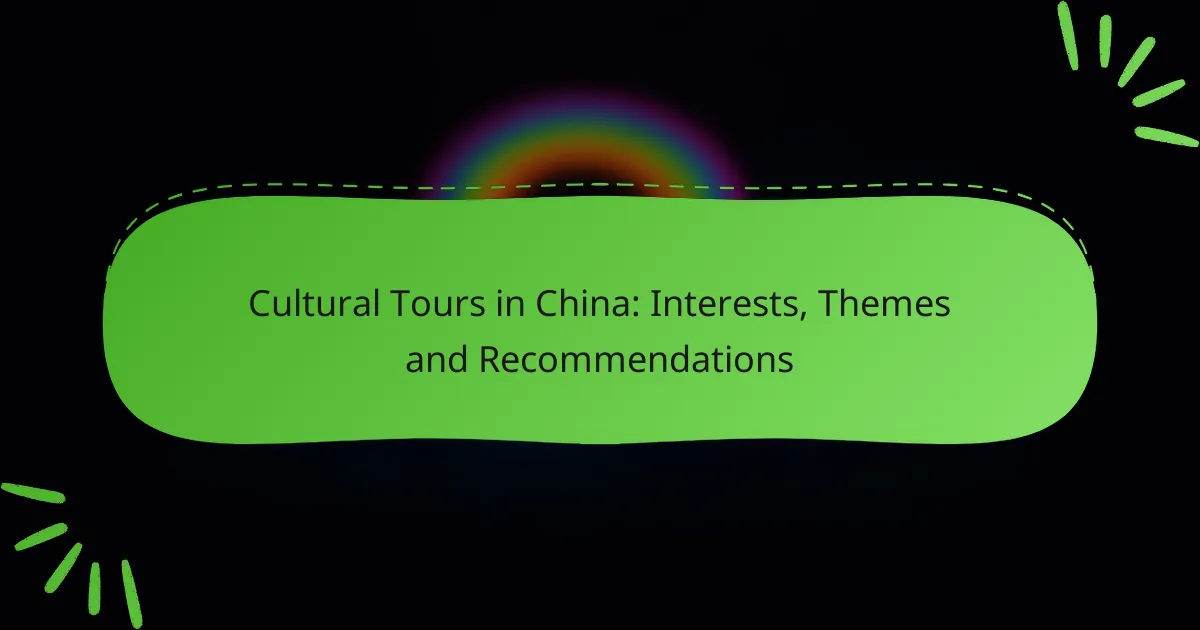China is home to a myriad of vibrant cultural festivals that celebrate its rich traditions and heritage. Events such as the Chinese New Year, Harbin Ice Festival, and Mid-Autumn Festival provide unique experiences across various regions, attracting both locals and tourists alike. Visitors can immerse themselves in traditional performances, savor local cuisine, and explore artisan crafts, making each festival a captivating journey into China’s cultural landscape.
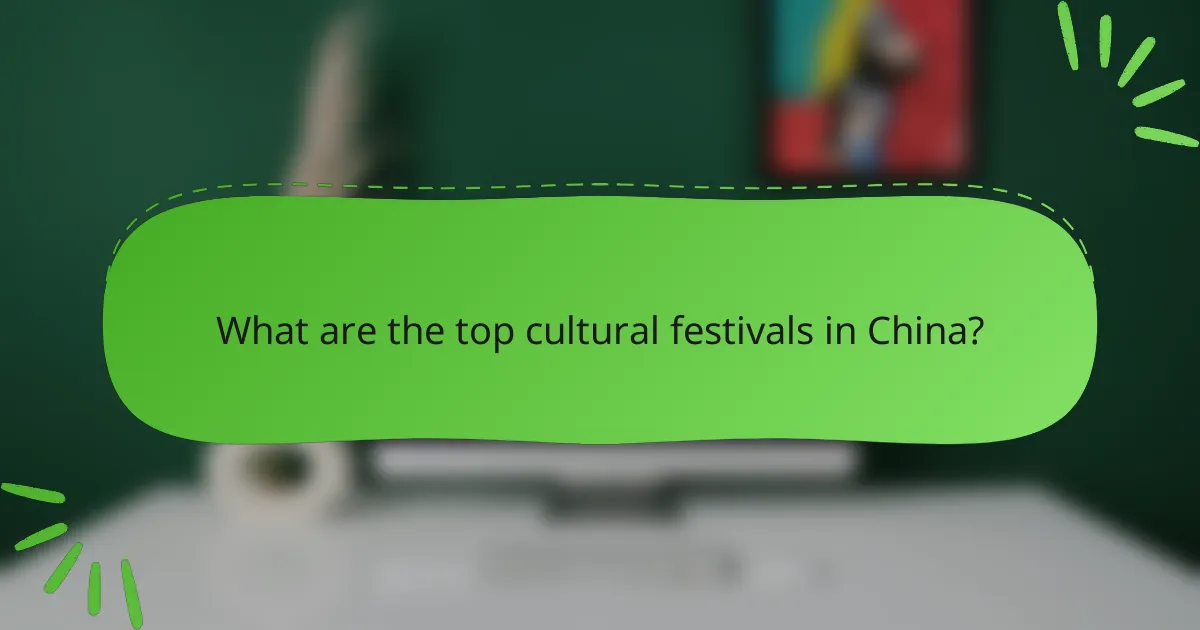
What are the top cultural festivals in China?
China hosts a variety of vibrant cultural festivals that showcase its rich traditions and heritage. Some of the most notable events include the Chinese New Year, Harbin Ice Festival, Qingming Festival, Mid-Autumn Festival, and Dragon Boat Festival, each offering unique experiences and celebrations across different regions.
Chinese New Year in Beijing
Chinese New Year, or Spring Festival, is the most significant celebration in Beijing, marked by family reunions, feasts, and various cultural activities. The festivities typically last for about 15 days, culminating in the Lantern Festival.
Visitors can enjoy spectacular fireworks, lion dances, and traditional performances in public squares. It’s advisable to book accommodations well in advance, as hotels fill up quickly during this peak travel season.
Harbin Ice Festival
The Harbin Ice Festival, held in Harbin, Heilongjiang Province, is renowned for its stunning ice sculptures and winter activities. This festival usually starts in early January and lasts until late February, attracting tourists from around the world.
Visitors can explore massive ice castles, enjoy ice skating, and participate in winter sports. Dress warmly, as temperatures can drop significantly, often reaching below -20°C (-4°F).
Qingming Festival in Hangzhou
The Qingming Festival, also known as Tomb-Sweeping Day, is observed in Hangzhou, where families honor their ancestors by visiting graves and making offerings. This festival typically occurs in early April and is a time for reflection and remembrance.
In addition to grave visits, locals often enjoy outdoor activities such as kite flying and spring outings. The picturesque West Lake provides a beautiful backdrop for these celebrations.
Mid-Autumn Festival in Shanghai
The Mid-Autumn Festival, celebrated in Shanghai, is a time for family gatherings and mooncake sharing. This festival usually falls in September or October, coinciding with the full moon.
Festivities include lantern displays and cultural performances. It’s common to see families enjoying mooncakes, which symbolize reunion and harmony. Visitors should try various flavors of mooncakes available in local bakeries.
Dragon Boat Festival in Guangzhou
The Dragon Boat Festival, celebrated in Guangzhou, features exciting dragon boat races and the consumption of zongzi, sticky rice dumplings wrapped in bamboo leaves. This festival takes place on the fifth day of the fifth lunar month, usually in June.
Visitors can watch thrilling races along the Pearl River and participate in local festivities. It’s a great opportunity to experience traditional Chinese culture and enjoy the vibrant atmosphere of the city.
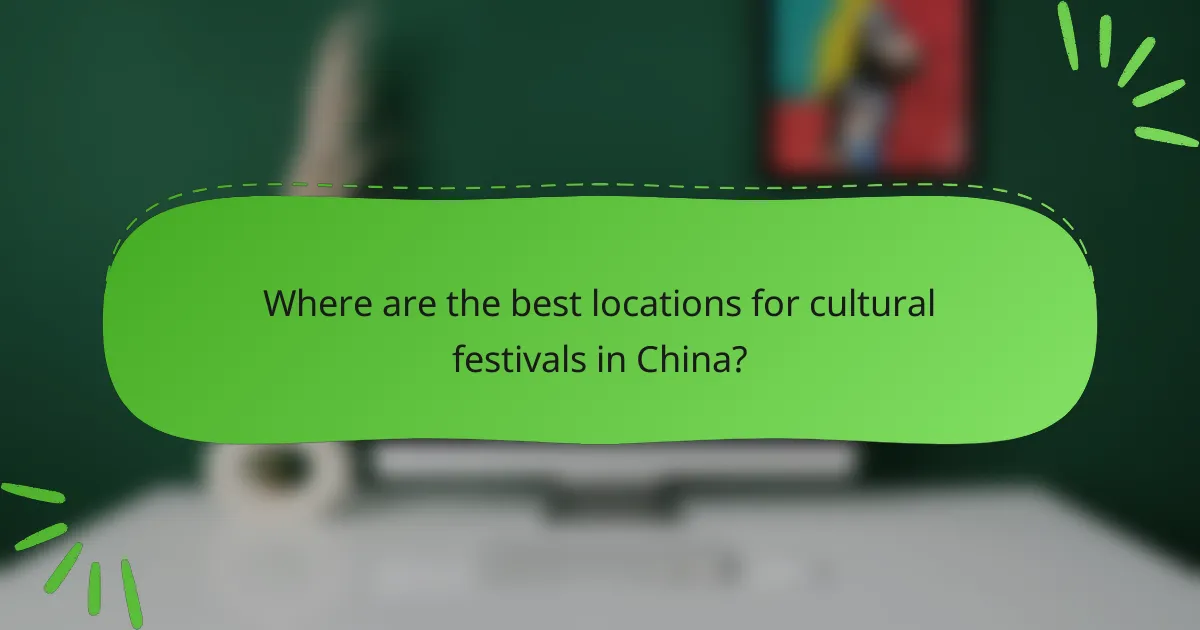
Where are the best locations for cultural festivals in China?
The best locations for cultural festivals in China include major cities and historical sites that host vibrant celebrations throughout the year. These venues not only showcase traditional customs but also attract both locals and tourists, providing a rich cultural experience.
Beijing’s Temple of Heaven
Beijing’s Temple of Heaven is a UNESCO World Heritage site and a prime location for cultural festivals, particularly during the Spring Festival and the Mid-Autumn Festival. Visitors can enjoy traditional performances, art exhibitions, and local food stalls that highlight Chinese heritage.
When attending festivals here, arrive early to secure a good viewing spot for performances. The atmosphere is lively, with many opportunities to participate in cultural activities such as calligraphy and tai chi.
Harbin Ice and Snow World
Harbin Ice and Snow World is famous for its stunning ice sculptures and winter festivities, attracting visitors from around the globe. The festival typically runs from late December to February, featuring elaborate ice castles, light displays, and winter sports.
Dress warmly, as temperatures can drop significantly. Plan to visit in the evening to see the illuminated sculptures, which create a magical atmosphere. Tickets are usually affordable, making it accessible for families and groups.
West Lake in Hangzhou
West Lake in Hangzhou is renowned for its picturesque scenery and cultural festivals, including the West Lake International Fireworks Festival and the Dragon Boat Festival. These events often feature traditional music, dance performances, and local delicacies.
To fully enjoy the experience, consider taking a boat ride on the lake during the festivals. This provides a unique perspective of the celebrations and the stunning natural beauty surrounding the area.
Pudong in Shanghai
Pudong in Shanghai is a modern hub for cultural festivals, particularly the Shanghai Lantern Festival and the Shanghai International Arts Festival. These events showcase a blend of traditional and contemporary art, attracting diverse audiences.
Be prepared for large crowds, especially during peak festival times. It’s advisable to purchase tickets in advance for popular events and arrive early to navigate the area comfortably.
Guangzhou’s Pearl River
Guangzhou’s Pearl River hosts various cultural festivals, including the Cantonese Opera Festival and the Guangzhou International Light Festival. These events highlight the region’s rich cultural heritage and artistic expressions.
Visitors can enjoy performances along the riverbanks, with food vendors offering local specialties. Consider taking a river cruise during the festivals for a unique view of the celebrations and the city’s skyline.
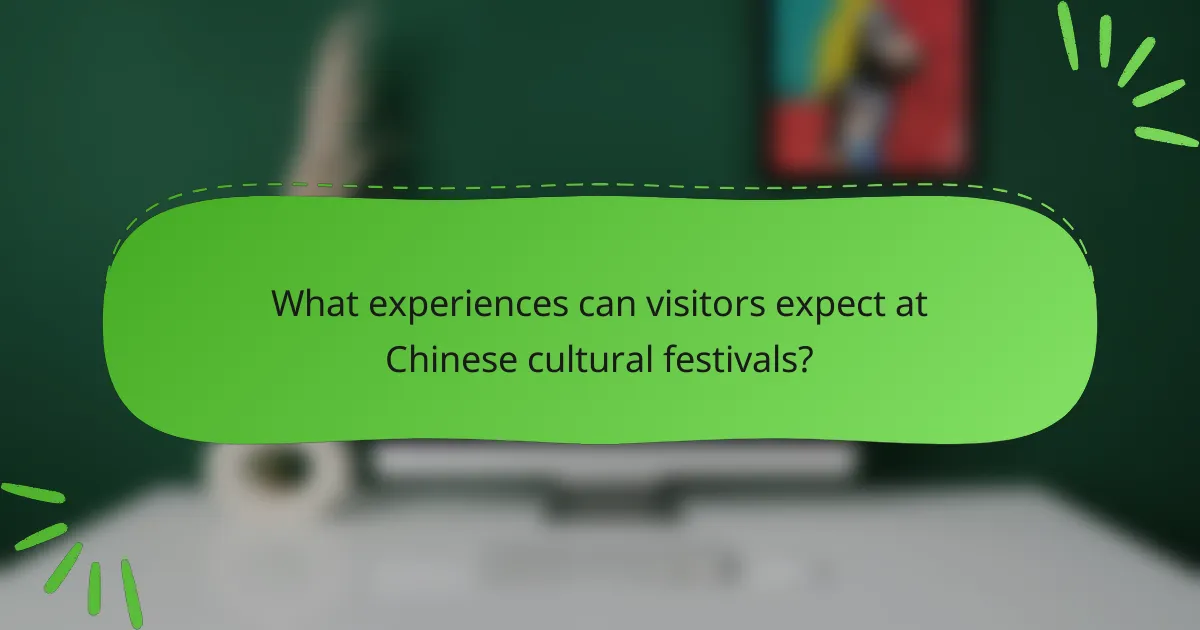
What experiences can visitors expect at Chinese cultural festivals?
Visitors at Chinese cultural festivals can expect a vibrant mix of traditional performances, delicious local cuisine, unique artisan crafts, and engaging cultural workshops. These festivals offer immersive experiences that highlight China’s rich heritage and community spirit.
Traditional performances and parades
Traditional performances and parades are central to Chinese cultural festivals, showcasing rich artistic expressions like lion dances, dragon dances, and folk music. These events often involve colorful costumes and elaborate choreography, captivating audiences of all ages.
Parades typically feature local community groups and schools, providing a platform for participants to celebrate their culture. Visitors can enjoy the lively atmosphere, often accompanied by the sounds of drums and gongs, which enhance the festive spirit.
Local cuisine and street food
Local cuisine and street food play a significant role in the festival experience, offering a taste of regional specialties. Visitors can sample a variety of dishes, from dumplings and baozi to spicy skewers and sweet treats like tanghulu (candied fruit).
Street food stalls are abundant, providing an opportunity to enjoy authentic flavors at reasonable prices. It’s common to see vendors preparing food on-site, allowing visitors to witness the culinary process firsthand.
Artisan markets and crafts
Artisan markets at cultural festivals feature handmade crafts and traditional artworks, reflecting local culture and heritage. Visitors can find items such as silk products, pottery, and paper-cutting art, which make for unique souvenirs.
These markets often allow for direct interaction with artisans, who may demonstrate their craft techniques. Engaging with creators adds a personal touch to the shopping experience and supports local economies.
Cultural workshops and activities
Cultural workshops and activities provide hands-on experiences for visitors to learn about traditional practices. Common offerings include calligraphy, tea ceremonies, and martial arts classes, allowing participants to immerse themselves in Chinese culture.
These workshops are typically suitable for all skill levels and often encourage interaction among participants, fostering a sense of community. Pre-registration may be required for some activities, so checking festival schedules in advance is advisable.
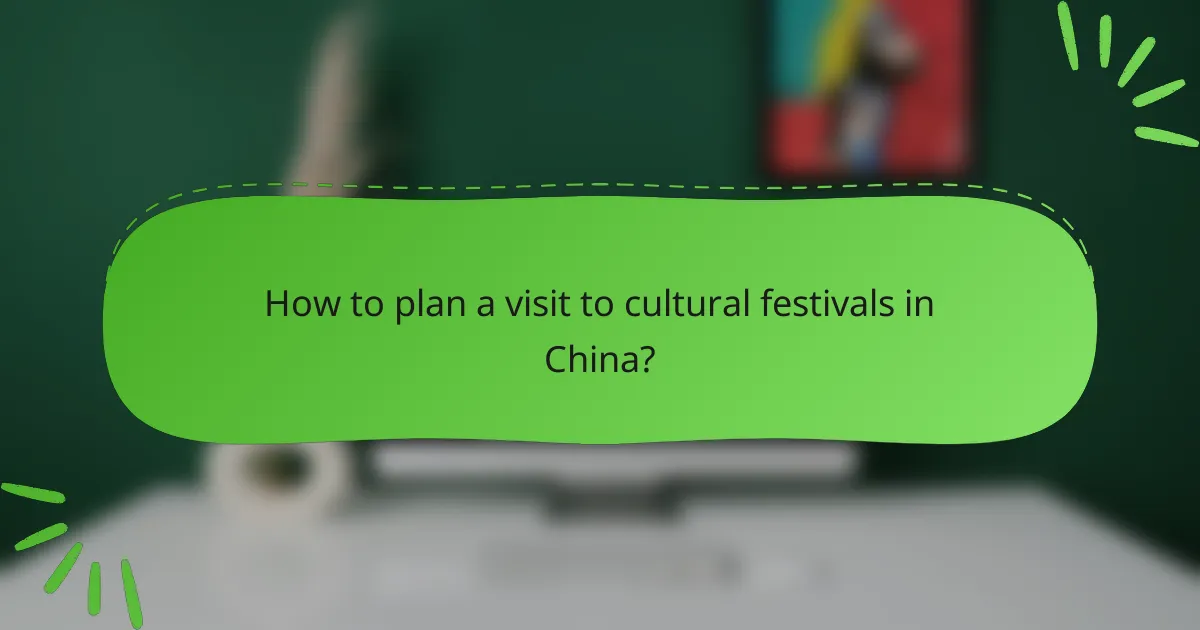
How to plan a visit to cultural festivals in China?
Planning a visit to cultural festivals in China involves understanding the festival dates, locations, and unique experiences they offer. It’s essential to research the specific festivals you want to attend and consider travel logistics, accommodation, and local customs.
Best times to visit
The best times to visit cultural festivals in China typically align with the spring and autumn seasons, when many major festivals occur. Key months include February for the Lunar New Year, April for the Qingming Festival, and October for the Mid-Autumn Festival.
During these periods, the weather is generally mild, making it comfortable for outdoor activities. However, be prepared for large crowds, especially during the Lunar New Year, as it is the most significant holiday in China.
Travel tips for festival season
When traveling during festival season, book transportation and accommodations well in advance to secure your plans. Train and flight tickets can sell out quickly, particularly around major holidays.
Familiarize yourself with local customs and etiquette to enhance your experience. For instance, during the Lunar New Year, it is customary to give red envelopes containing money as gifts. Understanding these practices can help you engage more meaningfully with the local culture.
Accommodation options near festivals
Accommodation options near cultural festivals in China range from luxury hotels to budget hostels, depending on your preferences and budget. Major cities often have a variety of choices, while smaller towns may offer fewer but charming local guesthouses.
Consider staying within walking distance of festival venues to avoid transportation hassles. Booking platforms can help you find accommodations that suit your needs, but it’s advisable to reserve early, especially during peak festival times.
